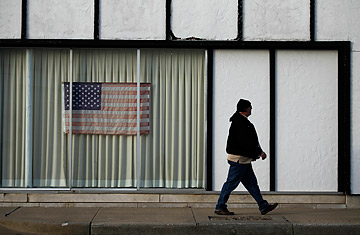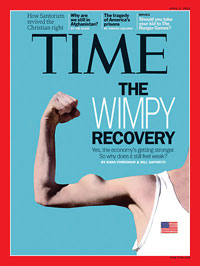
A man who declined to be identified walks past a business with an American flag in the window Tuesday, Jan. 24, 2012, in Moberly, Mo. Many in this small town in central Missouri will watch the State of the Union address closely after struggling to create jobs and suffering from a down economy.
 In this week's cover story, Rana Foroohar and Bill Saporito write that the best way to think of the current economic situation of the country is "as a patchwork recovery, one that creates mini-booms in mining hills, social-networking start-ups, auto factories, hospitals, railroads and conventions centers but leaves vast swaths of the country untouched."
In this week's cover story, Rana Foroohar and Bill Saporito write that the best way to think of the current economic situation of the country is "as a patchwork recovery, one that creates mini-booms in mining hills, social-networking start-ups, auto factories, hospitals, railroads and conventions centers but leaves vast swaths of the country untouched."
The patchwork nature of the recovery can be observed in a single state. Unemployment peaked in Missouri at 9.7%, but showed a surprising drop to 7.5 percent in January, the most recent figure. But, according to the Missouri Department of Economic Development, over the last 60 days, the industry with the greatest number of job openings was hospitals. The most job postings were for registered nurses, followed by sales reps and retail sales. Nearly 70% of the job listings were for permanent, full-time employment, and Kansas City had the largest number of job postings (just over 20,000). Education and health services make up about 15% of the Missouri economy.
"We're not falling off a cliff anymore," says Steven Fazzari, professor of economics at Washington University in Saint Louis. "But there is still a wait and see sense about the economy. It certainly doesn't feel like a recovery."
Missouri's problem, says Jack Strauss, Simon Chair of Economics at Saint Louis University in Saint Louis, "is that we don't have that engine that can slowly pull us out of the ditch." Traditionally, recoveries depend on manufacturing and construction to pull the economy out of recession. "That's houses and cars, and we're not getting much help from either," Strauss says. Instead, Missouri is relying right now on health care and bio science. "We're generating greater than average jobs in those areas." But those industries are geared more toward slow and steady growth than an explosion of new jobs. "There's no job boom in healthcare, because doctors don't move," Strauss says.
The rest of the state's businesses are in stasis — or worse. Jane Barr, 58, owner of an antique and gift shop in St. Charles, Missouri, questions talk of a recovery. January was slower this year than last, she says, despite a move to a storefront with significantly higher foot traffic. "Simply put, the economy sucks," she says. "Sorry to be so blunt, but that's it."
Barr said she's still selling the same type of goods, just far fewer of them. "I know what the price point for my customers is," she says. "And that hasn't really changed. It's just that people aren't buying." In response, she's decreased her own merchandise buying trips. And she's not alone. "When I go to Chicago to the market, there are fewer attendees," Barr says. "And it's not just the number of people there, it's also the vendors. There aren't as many as there used to be even last year."
Barr blames the spike in gas prices (now around $3.80 a gallon). "I see a lot of people shopping places they never did before," she says. "They're going to outlets and Aldi's, all the lower priced stores." Personally, Barr said she's cut back on grocery store visits. "It saves gas, but I've found that I spend less overall if I just don't go as often every month."
Some merchants are hoping for an improvement in the economy with the advent of spring and warmer weather. But Barr says she's not holding her breath. "We had a great winter, but that didn't make any difference," she says.
Marilyn Keevin, 53, owns a boutique bakery for dogs called "Canine Cookies and Cream" down the street from Barr. Business, she says, has been slower than normal, despite talk of a recovery. In fact, she was forced to lay off half her workforce, downsizing from four full-time employees to two. "A lot of it has to do with gas prices," she believes. "People don't have the extra money for luxury items," like her high end dog biscuits. Keevin doesn't see many signs that things will improve soon. "I think it's getting worse," she says. "Job security isn't there, gas prices are getting higher, groceries cost more. People can't even make it now, what are they going to do?"
At the other end of the spectrum is Holly Haddox, 60, owner of The Conservatory, an indoor garden venue for weddings. "Our business is good!" Haddox enthuses. "We are rather unique, with a tropical garden atmosphere." Haddox theorizes the slowdown might actually have helped her business in some ways. "We are a fairly small venue [she can accommodate up to 100 guests], so if people are downsizing their wedding plans, they might come to us." And while many of the nearby retail shops had a dismal January, The Conservatory was bustling. "So many people get engaged at Christmas, and they come book in January," Haddox explains. "So January is our slowest month for weddings, but it's huge for bookings."
Haddox says she thinks "things are picking up. Our customers are very upbeat, and we're doing fairly steady business. I'm not hearing a lot of complaining."
Anne Cramer, 44, of Kirkwood, Missouri, is looking for a new house. She decided to take advantage of low interest rates and low housing prices to upgrade to a bigger place. "I want to lock in a low interest rate before inflation hits," says Cramer, president of a limestone quarry in Illinois. She says she has always lived below her means, and that hasn't changed, despite tempting housing deals. "I'm not looking to splurge," she says. "I think it's important in this economy [to be frugal], especially since I work in the construction industry. I want to be financially responsible."
Cramer says she sees little signs of improvement in the economy. "In fact, I think it's getting worse, which is another reason I'm being cautious about buying a new house," she says. "I don't see any indicators in my business that things are improving." Cramer says she just returned from a national trade conference, and the mood there was a bit grim. "No one is talking positively about the future," she says. "Everyone thinks the [downturn] is going to be a long term issue. I don't know anyone who thinks we're in an upswing."
